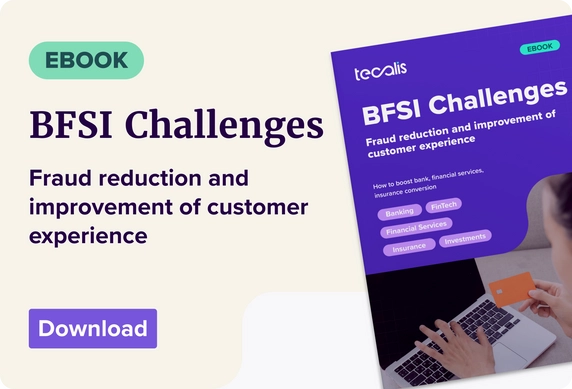Index
Get the latest news right in your inbox
Access to all types of financial, banking and fintech services is a key element for the development of both individuals and companies. For financial institutions, assessing the risk of granting a loan or providing a product is crucial to maintain stability and sustainability. This is where Credit score comes into play, an indispensable tool for analyzing the creditworthiness of applicants and making informed decisions.
In this article, we will break down in detail what credit score is, how it affects companies and the different ways to calculate and improve it. In addition, we'll explore the influence of the finscore, the importance of emerging technologies and the current regulations that are redefining the financial landscape. Read on to discover everything you need to know about credit score and how it can impact your access to credit.
What is a credit score?
Credit score is an essential tool used by financial institutions to assess the solvency and payment capacity of applicants for credit or products such as insurance, mortgages, accounts, etc. This system is based on algorithms and mathematical models that analyze several variables of the financial history of a person or company, in order to assign them a score that reflects the risk associated with granting them a loan or any other financial product.
Credit score directly affects and impacts financial products such as mortgage loans, other types of loans or financial services such as insurance policies.
The score obtained through Credit score determines the likelihood that the applicant will meet his or her financial obligations and be eligible to obtain the financial product or service. A high score indicates a lower risk of default, while a low score suggests a higher risk. This system is crucial both for financial institutions, which seek to minimize their risks, and for applicants, who wish to obtain better credit conditions.
How credit score affects loan applications
Credit score plays a key role when applying for a loan, credit card or insurance. Financial institutions use this score to make informed decisions on the approval or denial of credit applications. A good credit score can facilitate access to loans with lower interest rates and more favorable terms. On the other hand, a low score may result in the denial of credit or the offer of less attractive terms, such as higher interest rates and shorter terms.
Variables that influence the credit score include payment history, level of indebtedness, age of credit accounts, among others. Maintaining good financial behavior, such as paying debts on time and keeping low levels of indebtedness and expenses, is crucial to improve and maintain a good credit score.


Credit score: how does it works in BFSI companies?
Credit score is not only relevant for individuals, but also for companies. Financial institutions use the business credit score to assess the financial health and payment capacity of companies applying for loans or lines of credit. This score is calculated using company-specific data, such as financial statements, credit history and payment behavior with suppliers.
For companies, a good credit score is vital to access financing for growth and expansion. In addition, a high score can improve business relationships with suppliers and partners, facilitating better payment terms and contract conditions. Therefore, companies should pay attention to their financial health and maintain management practices that favor a positive credit score.
Companies in the BFSI (Banking, Financial Services and Insurance) sector rely heavily on Credit score to make informed decisions about lending, risk assessment, service facilitation and customer management. These companies use advanced statistical models and machine learning algorithms to analyze a wide range of financial and behavioral data.
Credit score has a significant impact on the way BFSI companies operate and make decisions. Some of the key areas influenced by the credit score include:
- Risk assessment and management: The credit score allows BFSI companies to accurately assess the credit risk of their clients. A high score indicates a low risk of default, while a low score suggests a higher risk. This helps companies minimize loan losses and maintain financial stability.
- Credit decision making: Decisions on approval or denial of credit applications are largely based on the credit score. A good score can result in the approval of loans with favorable terms, such as lower interest rates and longer terms. On the other hand, a low score may lead to denial of the application or less favorable terms.
- Client segmentation: BFSI companies use Credit score to segment their clients into different risk categories. This allows them to offer customized products and services that fit the needs and risk profiles of each client. For example, clients with a good score may receive credit card offers with high limits and low interest rates, while clients with a lower score may receive products designed to help them improve their financial situation.
- Credit portfolio management: Credit score is crucial for BFSI companies' loan portfolio management. It allows them to monitor the performance of their clients and adjust their risk management strategies accordingly. For example, they can implement risk mitigation measures for clients with declining scores or adjust the terms of existing loans.
- Regulatory compliance: BFSI companies must comply with strict regulations regarding risk assessment and lending, especially AML (Anti-Money Laundering). The use of Credit score helps them ensure that their risk assessment processes are consistent and aligned with regulatory requirements.

How customer finscore influences the customer's finscore
The finscore, or financial score, is a variant of credit score that focuses on assessing the financial risk of an institution's individual customers. This system uses financial and behavioral customer data to generate a score that helps institutions make more accurate credit decisions.
The finscore significantly influences clients' ability to obtain financial products. A high finscore can facilitate access to credit with better conditions, while a low finscore can limit the options available or result in less favorable conditions. Financial institutions use the finscore to segment their clients and offer customized products that fit their risk profile.
Credit score not only helps BFSI companies manage risk, but also offers several additional advantages:
- Financial product optimization: By better understanding the risk profile of their clients, BFSI companies can design financial products that are better suited to the needs of the market. This can include the creation of customized credit lines, loans with risk-adjusted interest rates, and rewards programs for low-risk clients.
- Improved profitability: An efficient Credit score system enables BFSI companies to optimize their profitability by reducing the risk of default and better aligning their offerings with their clients' ability to pay. By minimizing loan losses and maximizing the return on loans granted, companies can improve their profit margin.
- Customer loyalty: By using Credit score to offer customized products and services, BFSI companies can improve customer satisfaction and loyalty. Clients who receive products tailored to their needs and risk profile tend to be more loyal and maintain a long-term relationship with the financial institution.
- Innovation and competitiveness: BFSI companies that implement advanced Credit score technologies, such as artificial intelligence and machine learning, can stay at the forefront of innovation in the financial sector. This allows them to compete more effectively in a dynamic and constantly evolving market by offering innovative products and high-quality services.
Credit score: how to calculate it
Credit score is a complex process that involves the collection and analysis of a large amount of financial and behavioral data from various sources and types. Financial institutions use advanced statistical models and algorithms to evaluate factors such as payment history, amount of debt, length of credit history, and type of credit used, among others. However, the process goes far beyond these basic elements, especially with the integration of KYC (Know Your Customer) solutions, anti-fraud controls and screening processes, onging monitoring, AML and other RegTech tools.
The process of calculating credit score in BFSI companies includes the following steps:
- Data collection: Detailed information is collected on applicants, which may include payment history, debt levels, income, employment, bank account and credit card information. KYC forms and other AML and anti-fraud controls are also analyzed.
- Credit history analysis: The applicant's credit history is evaluated, analyzing factors such as the punctuality of previous payments, the age of credit accounts, and the frequency of credit applications.
- Financial behavior assessment: Financial behavior patterns are analyzed, such as utilization of available credit, debt-to-income ratio, and credit line management.
- Use of algorithms and predictive models: BFSI companies apply mathematical models and machine learning algorithms to process data and generate a risk score. These models can identify correlations and patterns that are not evident through traditional analysis.
The importance of KYC in Credit score calculation
KYC policies are essential to ensure that financial institutions have a clear and accurate understanding of their customers' identities. This knowledge is crucial not only to prevent fraud and money laundering, but also to more accurately calculate credit risk. Companies specializing in KYC provide tools and services that make it possible to verify customers' identities, review their financial histories and monitor their activities for unusual or suspicious behavior. This is not only beneficial for both parties but a legal obligation in regions such as the European Union due to regulations such as eIDAS or AML6.
These companies use global databases, biometric verifications, document analysis and other advanced technologies to ensure that customers are who they say they are. By integrating this data into Credit score calculations, financial institutions can obtain a more complete and accurate picture of the risk associated with each customer.

The role of RegTech technologies in Credit score
RegTech, or regulatory technology, refers to technology solutions designed to help companies comply with financial regulations and standards. These technologies are especially useful for financial institutions that must manage large volumes of data and comply with complex regulations in multiple jurisdictions.
RegTech solutions include compliance automation, data analytics and risk management tools. These tools enable financial institutions to quickly identify potential risks, assess the creditworthiness of customers and ensure that they comply with all applicable regulations. By automating these processes, firms can reduce the risk of human error and increase operational efficiency.
Integration of KYC and RegTech in Credit score
The integration of KYC and RegTech in Credit score enables financial institutions to more accurately and efficiently assess the credit risk of their customers. By combining data from multiple sources and using advanced technologies to analyze it, these solutions provide a holistic view of each customer's risk profile.
For example, a KYC company can provide detailed data on a customer's financial history and identity through bank scraping, while a RegTech solution can analyze this data in the context of applicable financial regulations and detect potential risks. By integrating this data and analysis into the Credit score model, financial institutions can obtain a more accurate risk score and make more informed credit decisions.
Continuous evaluation and monitoring
Credit score is not a static process; it requires continuous evaluation and constant monitoring to remain current. KYC, KYB, AML and RegTech companies play a crucial role in this regard, providing tools that allow financial institutions to monitor their customers' activities in real time and adjust their risk scores as needed.
For example, if a customer exhibits a sudden change in financial behavior, such as a significant increase in debt levels or a delay in payments, the system can alert the financial institution and adjust the customer's risk score accordingly. This proactive approach allows financial institutions to better manage risk and take preventive measures to mitigate potential problems.
Benefits of credit score for businesses and customers
The integration of KYC and RegTech in Credit score offers numerous benefits for both financial institutions and their customers. For financial institutions, these technologies improve score accuracy, reduce fraud and compliance risk, and increase operational efficiency by reducing costs and improving processing times. For customers, more accurate score can translate into better credit terms and greater transparency in the risk assessment process.
These technologies enable financial institutions to obtain a more complete and accurate view of their customers' credit risk, improving decision making and ensuring compliance with applicable regulations. By adopting these solutions, financial institutions can not only protect themselves against risk, but also provide better service to their customers.
Open banking and PSD3: More and better data to calculate risk in the credit score
Open banking and PSD3 are revolutionizing the way financial institutions access and use customer data to calculate credit risk. Open banking allows customers to share their financial data securely with third parties, facilitating a more complete and accurate assessment of their creditworthiness.
The PSD3 regulation, which follows PSD2, establishes a regulatory framework that promotes competition and innovation in the financial sector, obliging banks to open their systems and share data with other entities, always with the customer's consent. This allows financial institutions to have access to a greater amount of information, which improves the accuracy of Credit score and facilitates the offer of financial products better adjusted to customers' needs and risk profiles.

AI tools to improve credit score
Artificial intelligence (AI) and RegTech (regulatory technologies) are transforming the Credit score process, making it more efficient, cheaper and more accurate. AI makes it possible to analyze large volumes of data in real time for both B2C and B2B (Know Your Business - KYB) operations, identifying patterns and trends that would be difficult to detect using traditional methods.
RegTech tools help financial institutions comply with regulations and standards more effectively by automating processes such as identity verification, notarization verification and transaction monitoring. These technologies not only improve the accuracy of Credit score, but also help reduce costs and minimize the risk of human error.
Bank scrapping: Credit score simulator
Bank scrapping and bank account verification is a technique that involves the automated extraction of financial data from different sources to calculate credit scores more accurately. Credit score simulators use this data to provide an estimate of an applicant's credit score, allowing financial institutions and applicants themselves to have a clear idea of their credit situation before applying for a loan.
These simulators are valuable tools for consumers and businesses, allowing them to assess their creditworthiness and take steps to improve their score before submitting a credit application. They are connected via open banking PSD3 to the customer's approved accounts to extract a finscore during the KYC/AML process. In addition, the simulators can help identify areas for improvement and establish more effective financial strategies.

In summary, Credit score and scrapping is an essential tool for assessing the credit risk of individuals and companies. Its calculation and application have evolved thanks to technological advances such as AI and open banking, as well as regulations such as PSD3. Maintaining a good credit score is crucial to access better credit conditions, and tools such as Credit score simulators can be of great help to understand and improve this score.
























